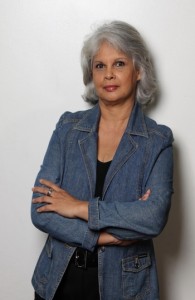Who Publishes Tales From the Edge?
 Writing from the edge of the world, wanting to tell our stories, our many stories that are also part of the romance, the history, the poetry of the world, it is not so easy to make ourselves heard. Even as globalization continues to be a buzz word, it is the unique particularities of lives everywhere that still make for many of our more interesting tales.
Writing from the edge of the world, wanting to tell our stories, our many stories that are also part of the romance, the history, the poetry of the world, it is not so easy to make ourselves heard. Even as globalization continues to be a buzz word, it is the unique particularities of lives everywhere that still make for many of our more interesting tales.
In the Caribbean, however, we being mostly a string of island nations peopled by small populations, there is little chance of commercial success for a publishing industry and writers have little alternative but to look elsewhere.
The new technology of the web helps in that those of us with access can Google information and can find ourselves a literary agent, like I did, and hope for publishers with enough heart and courage to add our voices to the global collective.
I was lucky enough to find that in Martin Hay and Paul Swallow of the independent publishers Cutting Edge Press. This was due entirely to the dogged persistence of my agent, Lisa Moylett, who never gave up and who assured me that she most certainly will find a home for my stories. She persisted and insisted and in the end, she did. It took years.
Were it not for this possibility, my alternatives would have been most limited. My first book, “A Silent Life”, was published by Peepal Tree Press, Leeds, which is subsidized by the British Arts Council and gives minority voices a place in the sun, so to speak.
The book had some success in Caribbean Literature academic circles but like most writers I want my stories to be read everywhere and by everyone. For me, they are not tales from the edge but are stories of our living, breathing experience. The publishing industry of Europe and North America does, however, view my physical and spiritual location as being outside of their domain and responsibility.
They have so many of their own writers to choose from that they hardly feel the need to look elsewhere. We are often left to depend on vanity or minority presses, or state-funded entities where they exist. The latter come with their own set of baggage as we are discovering in my country, Guyana, where the government in 2009 committed some £60,000 to the establishment of the Caribbean Press.
The idea was commendable. The press was to be a publishing house for the English speaking Caribbean and everything seemed to be going well as several works were reprinted as Caribbean Classics. The intent was that they would be distributed free to libraries and schools and be sold at competitive prices. So far, so good.
Then in December 2012 the state-owned newspaper carried a front page photograph of the subject minister beaming beside his 11-year-old daughter with her newly published book.
The report did not name the publishers and since most of us do not read the government’s propaganda press, the story would have gone unnoticed had a local writer, Ruel Johnson, not got wind of it and done some investigation.
He discovered that Caribbean Press were the publishers and he brought the matter to public attention through a letter to the more independent newspapers. Questions have since been asked about what appears to be a case of nepotism.
 The matter drew the attention of Transparency International Guyana Inc. and in a column in Stabroek News on June 4, 2013, under the headline “The Caribbean Press and the fiction of accountability”, the entity stated: “There is very little known about the press other than it had republished a number of Guyanese classics and works by [Dr David] Dabydeen, his sister, his cousin and the daughter of a minister.”
The matter drew the attention of Transparency International Guyana Inc. and in a column in Stabroek News on June 4, 2013, under the headline “The Caribbean Press and the fiction of accountability”, the entity stated: “There is very little known about the press other than it had republished a number of Guyanese classics and works by [Dr David] Dabydeen, his sister, his cousin and the daughter of a minister.”
Dabydeen is Guyana’s ambassador to China. He worked at the University of Warwick, has been published in the U.K. and is revered in Guyana as the one person among us who is knowledgeable in all aspects of the writing industry. The group noted that Dabydeen had revealed in a newspaper interview that he controlled the funds of the press and it went on to state: “This is surely shocking information for anyone concerned in the manner in which state entities manage public funds and the manner in which decisions are made regarding the beneficiaries of such funds.
So the professor makes the decisions on who gets published and determines how monies are spent? Is this a one-man show? This begs the question: to whom is he accountable?”
Johnson continues to ask questions through the media and if government’s recent announcement that it is considering shutting down the press is a consequence this would surely raise more suspicions than allay them.
Besides the corruption that seems endemic to such bodies, state-funded presses present other difficulties for writers. For instance, it is unlikely that a government would publish work that is critical of them, writers, even at the starting gate, would know that they would have to practice more than a little self censorship if they want their works published.
In the same vein, government can use the press as a tool to silence or appease its critics. The Caribbean Press has published some who are not seen as traditional government supporters and they have been noticeably silent on the imbroglio that has developed over the press’ accountability.
Even publishers from abroad, those from minority presses, can fall prey to the seduction of belonging to groups and cliques in these small societies where they can easily find themselves rubbing shoulders and clinking glasses with members of parliament and even with the president himself. Foreigners are much feted in countries like ours.
It’s a post-colonial proclivity. It’s heady stuff and it can make one lose one’s bearings especially if one enjoys being feted. This does, however, present difficulties for writers who wish to maintain a good measure of independence and integrity.
The region has produced literary Nobel Laureates in V.S. Naipaul and Derek Walcott. They both left the Caribbean and established their careers elsewhere. A generation on, nothing has changed and Naipaul’s biting criticism of the region still stands.
I count myself lucky in having an agent who believed and fiercely independent publishers who were willing.
—
Ryaan Shah was born and grew up in Guyana. She was educated there and in the United States, where she studied for a degree in journalism. For the next twenty years she traveled from the US to the UK and to the Cayman Islands, working in the field of communications and journalism. She returned to Guyana in 1997.
Her first novel, A Silent Life was published in 2005 and has been the subject of several academic presentations at Caribbean Studies conferences in North America and Europe. Weaving Water is her second novel. A death in the Family will come out in June. 2014.
Category: Being a Writer, Contemporary Women Writers, On Publishing, On Writing

























Dear Rhyaan:
I never stopped to think about this kind of “nationalism” spilling over into the writing “business,” but alas, when publishing is business first, quality writing second, then this kind of discrimination is not surprising. Governments should not decide what to publish; we’ve seen what happens when governments punish writers and others who disagree with them. You are indeed fortunate to have a great agent. Where do they train agents to be as open-minded and adventurous as the people they represent? Superb article. M. Latela
Excellent article. Although the Canadian market (and publishing industry) is bigger, I’ve been advised more than once not to bother with American agents or publishers because they won’t publish Canadians. Meanwhile, published Canadian authors are up against American authors (with their relatively greater marketing and exposure behind them) on the bookshop shelves.
I keep wondering if there’s a way for all the smaller (non-USA, non-UK) English-speaking countries to get together and form their own virtual “region”. I remember with 80s indie music several bands were popular everywhere but in the US, just because they couldn’t get the exposure there.
Thank you Ryann for sharing this story. As Lori says, it is hard for us in large wealthy countries to imagine the challenges of publication in small countries, especially those struggling with post-colonial limitations. State funding of the arts- though not so much of publishing in general- is widespread in much of Europe, but the challenge to remain independent can only be overcome by transparency. Your story contributes to that transparency.
Pretty amazing story. You really give new meaning to the concept of marginalized voices. Living here in the U.S. with its abundant (sometimes even overabundant) access to absolutely everything one might want in the arena of publishing, it’s easy to forget that this is not the case everywhere. I had not even imagined it how difficult it could be for residents of smaller, less populous regions to succeed in literature and related fields, or that their ability to do so might be hampered by government in a way that goes beyond censorship. What a world of difference the internet must make – it, at least, opens the door for writers like you to make their voices heard not only in their own countries, but all over the globe.